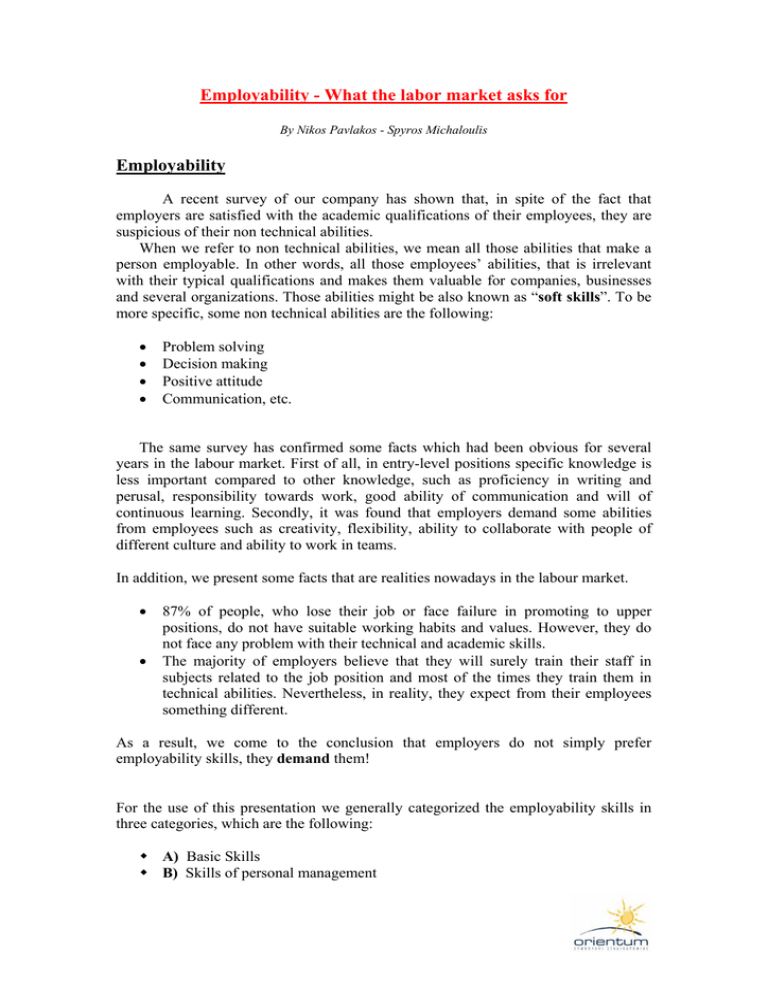Employability - What the labor market asks for Employability
advertisement

Employability - What the labor market asks for By Nikos Pavlakos - Spyros Michaloulis Employability A recent survey of our company has shown that, in spite of the fact that employers are satisfied with the academic qualifications of their employees, they are suspicious of their non technical abilities. When we refer to non technical abilities, we mean all those abilities that make a person employable. In other words, all those employees’ abilities, that is irrelevant with their typical qualifications and makes them valuable for companies, businesses and several organizations. Those abilities might be also known as “soft skills”. To be more specific, some non technical abilities are the following: • • • • Problem solving Decision making Positive attitude Communication, etc. The same survey has confirmed some facts which had been obvious for several years in the labour market. First of all, in entry-level positions specific knowledge is less important compared to other knowledge, such as proficiency in writing and perusal, responsibility towards work, good ability of communication and will of continuous learning. Secondly, it was found that employers demand some abilities from employees such as creativity, flexibility, ability to collaborate with people of different culture and ability to work in teams. In addition, we present some facts that are realities nowadays in the labour market. • • 87% of people, who lose their job or face failure in promoting to upper positions, do not have suitable working habits and values. However, they do not face any problem with their technical and academic skills. The majority of employers believe that they will surely train their staff in subjects related to the job position and most of the times they train them in technical abilities. Nevertheless, in reality, they expect from their employees something different. As a result, we come to the conclusion that employers do not simply prefer employability skills, they demand them! For the use of this presentation we generally categorized the employability skills in three categories, which are the following: A) Basic Skills B) Skills of personal management C) Skills of team work Α) Basic Skills Communication A candidate, in order to be successful in labor market, has to: • • • • • Understand information which is presented in various gestalts (words, charts, diagrams). Have the ability to write and speak correctly, so that other people understand him/her. Listen carefully and has the ability to ask suitable questions that help him/her understand other people’s opinions. Know how to share information by using new technological equipment such as fax, e-mail, voice mail, and computers. Use logical arguments in order to explain his/her ideas. Information management A candidate, in order to be successful in labor market, has to: • • Find, analyze and organize information by using technology and information systems. Find, analyze and put in practice knowledge and skills of different sections (for example, arts, languages, mathematics, and sciences). Use of numbers A candidate, in order to be successful in labor market, has to: • • • Have the ability to decide what needs to be estimated or measured. Be able to observe and write down data by using suitable methods, tools and technology. Have the ability to make predictions. Ability of problem solving A candidate, in order to be successful in labor market, has to: • • • • • • Have the ability to find and understand problems. Search for alternative opinions and evaluates them according to facts. Recognize the human, technical, scientific and mathematical dimension of a problem. Have the ability to recognize the cause of a problem. Be creative and innovative in problem solving. Evaluate the solution to a problem. Β) Skills of personal management Positive attitude A candidate, in order to be successful in labor market, has to: • • • • Have self-esteem. Face people, problems and situations with honesty. Show interest, initiative and will to try. Show enthusiasm. Responsibility A candidate, in order to be successful in labor market, has to: • • • Set goals and priorities with a balance between occupational and personal life. Have knowledge of time management and financial planning. Have the ability to put into practice crisis management. Flexibility A candidate, in order to be successful in labor market, has to: • • • • • • • Be able to work alone and in teams. Have the ability to do multiple tasks. Be innovative and suggests alternative methods of proceeding. Be open-minded. Response positively in changes. Accept feedback Have the ability to come up against with uncertainty Continuous learning A candidate, in order to be successful in labor market, has to: • • • • Be willing to learn and to develop himself/herself. Recognize his/her weaknesses and his/her virtues. Set his/her own learning goals. Recognize the opportunities. C) Skills of team work Abilities working in a team A candidate, in order to be successful in labor market, has to: • • • • • • Be able to work in a team. Understand the goals and the dream of the team. Respect the difference, the goals and the personality of the other members. Have the ability to give the right feedback. Be able to manage conflicts. Be able to offer motivation to the other members of the team. Participation in tasks A candidate, in order to be successful in labor market, has to: • • • • Have the ability to design, to carry out and evaluate a task. Be able to work with specific standards. Be able to examine and check a task at any time. Be able to provide the company the best result. Basic steps in order to succeed in your career! It is essential to present three basic steps, which are considered to be of vital importance nowadays and will help you make successful choices in the labor market. Step 1 Find out what do you want from your career and your life!!! More specifically, ask yourself: • • • • • What do you love doing? How do you imagine yourself 10 years from now? How would you like to live? What kind of goals do you have in your life? What makes you happy? Step 2 Obtain information from: • • • • Newspapers Internet Seminars Discussion with people (friends, professionals etc.) • Networking (people you know from your university, your family environment etc.) Career Counselors • Step 3 Act! • • • • • • Put an end to your dilatoriness. Believe that you have something extremely special that everyone needs. Dare. Never give up. Do not set drawbacks in your life by yourself. Stay flexible. Methods of obtaining job experience Here we present some very useful ways of getting job experience, as it is considered to be very important in the labor market. • Firstly, grab the chance to have a seasonal employment, because most of the times it leads to a permanent employment. For example, you can work at travel agencies during the summer, at shops during the Christmas vacations or at any job position that needs staff replacement. Secondly, you can attend training programs organized by big companies. Moreover, you should take part in programs of student exchange, such as AIESEC, or European programs, such as Leonardo da Vinci. In addition, you can always work during your studies. Furthermore, it is useful to work as a volunteer in organizations or to offer your services at the University in which you study. Finally, do not miss the opportunity to work at Career Offices. • • • • • Entrepreneurship In Greece, entrepreneurship is the less preferable solution of our working dynamic and it is very difficult for someone to think of creating a company by himself. However, entrepreneurship could be the answer to our unemployment problem! Unfortunately, we don’t discuss about how to create a company as often as we should. Some basic things about entrepreneurship are the following: • • If thinking of starting a company or a private office, first think of what you do best. Then think of what new you can offer to the market. • And, lastly, think how you are going to make money of it! There are a lot of programs about youth entrepreneurship, which can help you financially and consult you! At last, always think that: At the end everything goes well. And, if it doesn’t, is because… it is not the end yet!
